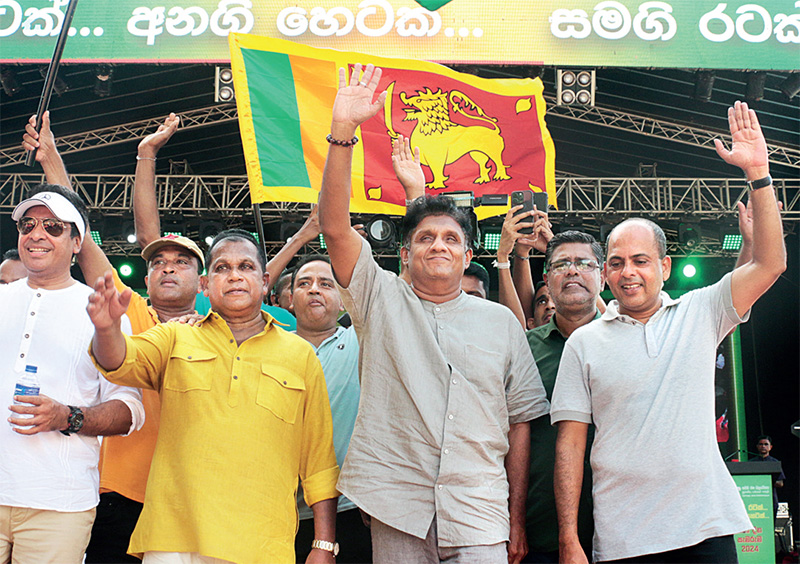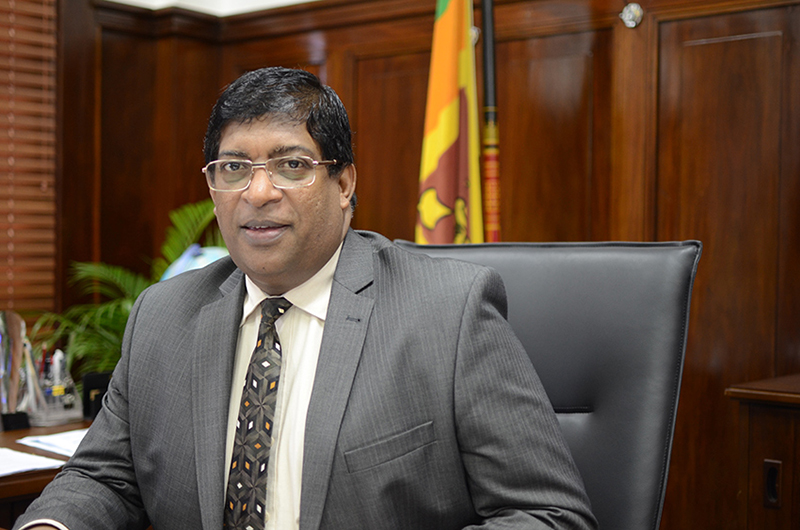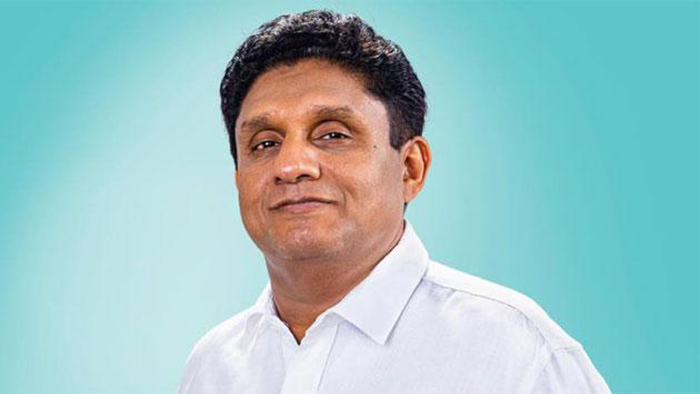News
Sajith pledges to renegotiate agreement with IMF

…Arjuna joins SJB Thalawakele rally
By Rathindra Kuruwita
Samagi Jana Balawegaya (SJB) would renegotiate the agreement with the IMF to make it more people friendly, SJB and Opposition Leader, Sajith Premadasa said yesterday (01) addressing their main May Day event at Chatham Street, Colombo Fort.
Premadasa said: “We will also establish presidential task forces to look into the wellbeing of children, women, and infants. A special programme will be implemented to uplift female-led households. We will take care of the 1.7 million differently abled people. We will establish independent anti-corruption entities that are created by entrenched clauses of the Constitution.”
Premadasa said people asked him why he had not accepted the post of Prime Minister offered to him by Gotabaya Rajapaksa in 2022.
“Some people tell me I should have taken a shortcut to power. I could have become the PM before the constitutional coup in 2018,” he said.
The Opposition leader said that an SJB government would boost spending on education and healthcare. The SJB government would also establish centres of IT akin to the Silicon Valley in the US, in all 25 districts in the country.
“We will establish a million start-ups. All government institutions will be made profitable. We will also establish private-public partnerships. Right now, those who run the government are engaged in a money grab.”
Premadasa said that they have come up with a proposal to get to the bottom of the Easter Sunday attacks. This has been presented to the Catholic Church, he said adding that
“We will bring to justice everyone behind the attacks”.
The SJB leader said that tea small holders own 40 percent of total tea cultivated areas. But they produce 70 percent of the tea output.
“The large-scale plantations only produce 30 percent. We will promote tea small holders by providing underutilized lands owned by these big plantation companies.”
Premadasa said that there is a need to create a national wealth fund.
SJB MP Harsha de Silva said 34 percent of the urban youth are unemployed and that only about 34 percent of the women are in the workforce. An SJB government would address the concerns of these people, he said.
“In the first five years of Sajith Premadasa’s tenure, he will create 1.5 million jobs and opportunities to be entrepreneurs. We have missed the opportunity to be in the global supply chain. The components of the iPhone are made in over 40 countries, but Sri Lanka is not among those countries. Sri Lanka is one of the most closed economies in the world,” he said.
Dr. de Silva said within a few months of becoming President, Sajith Premadasa will invite global brands to the country. The SJB will also take steps to revive the 250,000 micro, small and medium enterprises that have closed down.
Former MP, Mujibur Rahuman said that they chose the location because of significant events that transpired in the area during the 2022 Aragalaya.
“Two people from our party joined Ranil Wickremesinghe in 2022. One of them recently said a bunch of SJB MPs will crossover today. That has not happened,” he said.
Meanwhile, former MP Hirunika Premachandra alleged that the venue they wanted to hold the May Day rally has been given to the National People’s Power (NPP). This is an indication that President Ranil Wickremesinghe has a soft spot for NPP leader Anura Kumara Dissanayaka, she said.
“We also see that the United National Party (UNP) and the Sri Lanka Podujana Peramuna (SLPP) have joined hands. Ranil always had close ties with the Rajapaksas and he destroyed the UNP to ensure that the Rajapaksas could stay in power without a challenge.
Earlier in the day, they held another rally at Nuwara Eliya, which was organised by the Tamil Progressive Alliance (TPA). Opposition Leader Sajith Premadasa and Arjuna Ranatunga, former Sri Lanka Cricket Captain and former Minister, were present at the rally.
Latest News
Advisory for Heavy Rain issued for the Central, Uva and Sabaragamuwa provinces and in the Ampara, Batticaloa and Polonnaruwa districts

Advisory for Heavy Rain Issued by the Natural Hazards Early Warning Centre at 12.00 noon on 21 February 2026 valid for the period until 08.30 a.m. 22 February 2026
Due to the low level atmospheric disturbance in the vicinity of Sri Lanka, Heavy showers above 100 mm are likely at some places in the Central, Uva and Sabaragamuwa provinces and in the Ampara, Batticaloa and Polonnaruwa districts and fairly heavy showers above 75 mm are likely at some places elsewhere.
Therefore, the general public is advised to take adequate precautions to minimize damages caused by heavy rain, strong winds and lightning during thundershowers.
News
Ravi demands full disclosure on Lanka’s usable reserves, flags forex leakages

Opposition MP Ravi Karunanayake on Wednesday called for an urgent government statement to Parliament on the integrity and usability of Sri Lanka’s Gross Official Reserves (GOR), raising concerns over foreign exchange leakages and regulatory consistency under the Foreign Exchange Act No. 12 of 2017.
Raising the issue under Standing Order 27 (i), Karunanayake urged the Government to provide a comprehensive disclosure on the composition, encumbrances and deployability of the country’s reserves, as well as on the Central Bank’s oversight of foreign currency transactions.
“Reserve credibility depends not merely on headline numbers, but on transparency, enforceability and consistency in regulation,” the MP told the House.
He sought clarification on the latest reported GOR figure and the net usable reserves after excluding encumbered assets, swaps and pledged balances. He also requested details of annual revenue earned on reserves from 2023 to 2025.
Following are the questions raised by MP Karunanayake:
1. What is the latest reported GOR figure, and what is the net usable reserve after excluding encumbered assets, swaps, and pledged balances? What is the revenue earned on are GOR 23-25 per year?
2. Provide a separate and detailed breakdown of GOR, including: (a) Monetary gold (quantity and valuation basis) is it real gold or gold paper? (b) Foreign currency assets by major currency and instrument; (c) SDR holdings; (d) IMF reserve position; (e) Foreign currency swaps, specifying counterparty type, principal amount, tenure, maturity profile, and all-in cost; (f) Domestic swaps, specifying amount, tenure, rollover terms, collateralisation, and effective cost.
3. Of the total reserves reported, how much is encumbered, swap-backed, or otherwise not immediately deployable for debt servicing or currency stabilisation?
4. What SLR spread, fee, or margin does the Central bank apply when buying or selling USD to the Government for reserve accumulation and external debt servicing and what total profit or gain has the C.bank realised from such transactions during the past three financial years? Advice per year.
5. Is the Central Bank subject to continuous and statutory audit by the Auditor General? If so, will the Government table the most recent audit report, specifying audit scope, sample size, reserve confirmations, swap verification and gold custody validation?
6. What triggered the recent circular warning domestic institutions on foreign currency transactions?
7. Has the C.bank quantified foreign exchange and tax revenue losses resulting from Sri Lanka-based businesses routing credit card and commercial payments through overseas payment gateways?
8. If domestic entities are regulated strictly, why has a binding circular not been issued against noncompliant business entities using foreign payment gateway arrangements that divert foreign exchange outside Sri Lanka’s regulated banking system?
The government asked for two weeks’ time to respond to the queries.
by Saman Indrajith
News
Sajith exposes highly questionable coal imports from South Africa in 25 vessels; calls for independent probe

Opposition Leader Sajith Premadasa yesterday alleged in Parliament that eight recently imported coal shipments were substandard and called for an independent probe into the matter.Speaking in the House, Premadasa said Sri Lanka typically requires 36–38 coal shipments annually. While 11 Russian shipments received so far had raised no concerns, he claimed that 25 vessels ordered from South Africa under a new tender were facing quality issues.
He cited combustion reports from the Norochcholai Coal Power Plant showing that the eight shipments already received under the new tender failed to generate the expected 300 megawatts per unit. According to the MP, the outputs were: 285 MW, 290 MW, 260 MW, 295 MW, 285 MW, 270 MW, 275 MW, and 255 MW.
“These are scientific data generated automatically through boiler combustion reports that cannot be altered,” Premadasa said, asserting that the figures indicate the coal supplied was below required standards.
He warned that low-quality coal could increase fuel consumption, raise operational costs, and damage equipment. Any shortfall in power generation, he said, would necessitate additional coal imports or greater reliance on diesel power, ultimately driving up electricity tariffs for consumers.
“The loss will have to be borne by the electricity consumer,” Premadasa said, urging the government to clarify whether the shipments met required specifications.
He also criticized delays and changes in tender requirements, alleging that supplier eligibility criteria had been relaxed to allow non-standard providers.
by Saman Indrajith
-

 Life style7 days ago
Life style7 days agoMarriot new GM Suranga
-

 Business6 days ago
Business6 days agoMinistry of Brands to launch Sri Lanka’s first off-price retail destination
-

 Features7 days ago
Features7 days agoMonks’ march, in America and Sri Lanka
-

 Features7 days ago
Features7 days agoThe Rise of Takaichi
-

 Features7 days ago
Features7 days agoWetlands of Sri Lanka:
-

 News7 days ago
News7 days agoThailand to recruit 10,000 Lankans under new labour pact
-

 News7 days ago
News7 days agoMassive Sangha confab to address alleged injustices against monks
-

 Features6 days ago
Features6 days agoGiants in our backyard: Why Sri Lanka’s Blue Whales matter to the world













